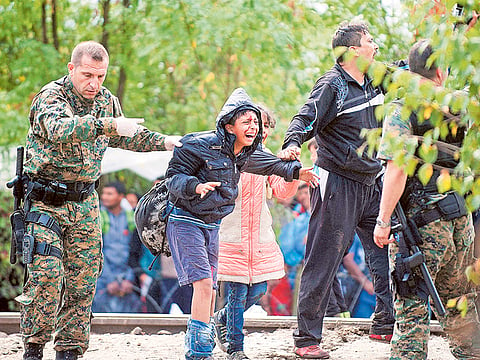Living in Kos, the camp of no return
For many migrants hoping for a better life, this is just one stop on a long, treacherous route

Kos, Greece: A fat rat as big as a cat scurries over the feet of a young man lying on the seashore.
It causes a flurry of activity, and you can see its progress along the beach by the sudden shouts and leaping figures, and the stones and sticks thrown its way.
Conditions here in most public places are rank dirty. Not squalid dirty — more weighed down by putridity. There’s a heavy sour smell in the air, and the odour of urine is never far away.
At a small park, no bigger than 200 metres by 70 metres, several hundred refugees live, sleep, and wait together in what little shade the trees offer against summer temperatures that reach 38 degrees Celsius.
A young toddler is inconsolable.
“Shusssh baba,” his mother rocks and cradles him. “Shusssh baba, shusssh,” and she wipes a stream of tears that are falling down his face that’s topped with a mop of dark brown curly hair. Her loving thumb smudges the tears over his cheek, cleaning it.
“Shusssh baba, shusssh.”
Slowly he begins to quieten, gasping as his cries subside.
The family speak Arabic, are Syrian, and are a group of nine. They share large bottles of water and break bread rolls. Two empty tins of red kidney beans have been shared by the group so far this day, and it’s well past four in the afternoon.
There’s a bad outbreak of diarrhoea going around — not cholera grade — just a really bad bug from too many people living too close together in conditions that are, well, difficult to say the least.
Three portable toilets are overworked and, in one case, overflowing.
What bottled water that is available disappears as soon as it’s distributed. Same with the bread.
There’s one tap with water that is supposed to be only good enough to wet the grass and flowering bushes, but that doesn’t deter the park’s temporary residents from filling up their water bottles. There’s no other choice — and is likely to be the cause for some of the cases of diarrhoea.
“This is Europe and they treat us like we are criminals,” Mohammad, one of the group of nine says in English that’s good enough to vent his anger and frustration. “We are not criminals. We want a better life. We want peace to live and bring up our children. Please, Europe must help us.”
Greek authorities on Kos are simply overwhelmed by the sheer numbers of migrant refugees crossing over to its eastern islands by the boat load, by the day, for weeks now, with no end in sight.
This is European Union territory and, once here, the displaced, desperate and disparate are supposed to get temporary residency cards that will allow them to stay in Greece for at least 30 days and up to six months. They can get basic health care and little else — and technically they’re not allowed to travel beyond Greece into the rest of the European Union. But for the 50,000 who have made it to Greece in July and the many more who follow in August, moving into the rest of the European Union is the goal, in what has become the greatest migration crisis since the end of the Second World War.
At a park that runs on both sides of a stream past some ancient Greek ruins, it’s difficult to hear yourself think. Swarms of noisy cicada are in full chorus in the trees, rattling, scratching and screeching at a volume that’s near deafening. There, migrants rest, trying to shut out the noise, others washing what ever they have with them in the stream, hanging clothes on bushes in an attempt to keep clean and maintain a little personal pride in this life-changing journey all are fully committed to: There is no going back to Homs or Aleppo, Daraa or Damascus.
There is also a social order to this park — Afghans on one side of the stream, Arab on the other. They only come together when the water and bread delivery comes in the morning and evening. And if they get to where ever they are going to — most say Germany — they will again be divided in their migrant communities. But united forever for having endured so much on such a long, treacherous and torturous trek.
Thankfully, that inconsolable toddler is too young to remember it, tears and all.



